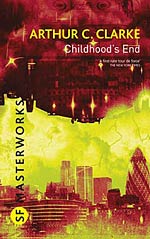
![]() ScoLgo
ScoLgo
12/24/2015
![]()
I thought I had read this book a long time ago but, as I started my 're-read', I realized I had not. It had just been sitting there on my shelf for years. Sometimes I scare myself.
Childhood's End is a strange amalgam of tropes; Alien invasion. Utopian society. Christian mythology. Interstellar travel. Group consciousness. Metaphysics. And more. It is also an exploration of the power of deception. Clarke imagines a day when giant spaceships arrive and park above the major cities of the world. Instead of blowing up the cities, a la the Independence Day film, the mysterious aliens lay down some benign new rules for humanity that result in eradicating war and raising the standard of living for all people. But of course, all is not candy sparkles and sunshine. Back to the power of deception; Similar to how parents dole out the truths of life to their children as they grow and become better able to assimilate those truths, the Overlords keep humanity in the dark regarding their true purpose in coming to Earth. Over the years, they slowly reveal themselves and their plans, which turn out to not be their plans at all. By the time we reach the bittersweet ending, (and a strangely hopeful yet downbeat ending it is), humanity has changed in unexpected ways.
This book must have shaken a few branches when first released in 1953. Not surprisingly, over 50 years later, it holds up really well. The prose is crisp. The concepts huge. The book short. Today's authors of speculative fiction, with their 700-page epics, could learn a thing or two from the original masters of the genre.